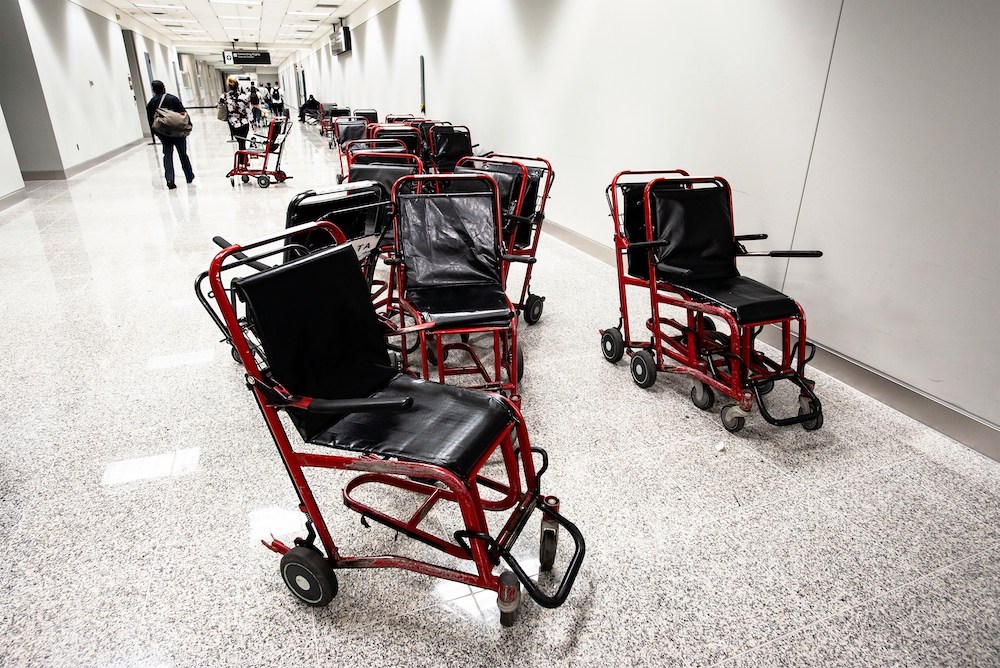6 tips for attendees who use a wheelchair or require special assistance
For disabled attendees, careful planning and proactive communication can make a significant difference. Here’s a step-by-step guide to help you assist them when flying to your event.
1. Request Assistance in Advance
Federal law, like the Air Carrier Access Act, mandates that airlines provide assistance to passengers with disabilities. Encourage attendees to request accommodations when booking their flights online or by calling the airline’s special assistance line.
On airline websites, look for options like “special assistance” and specify the type of assistance needed (e.g., mobility, service animal). Provide detailed information about the specific requirements.
While airlines may contact attendees for further details, advise them to call the airline a day or two before the flight to confirm their requests are noted and understood by ticket agents.
Proactive confirmation helps prevent potential issues and ensures a smoother experience.
2. Give Ample Time at the Airport
Advise attendees to arrive at the airport well in advance of their flight’s departure time.
For international flights, recommend arriving two to three hours early.
For domestic flights, recommend arriving one and a half hours early.
This allows sufficient time for navigating the airport and ensuring requested assistance is available.
Be aware that potential staffing shortages may lead to longer wait times for assistance.
3. Be Vocal at Check-In
That doesn’t mean rude. Be polite, but attendees who need assistance should make their presence known. Upon arrival, attendees should immediately inform a skycap or ticket counter agent that they have requested assistance.
If needed, wheelchair assistance or a guide for visually impaired individuals will be arranged.
Airline personnel are required to assist with carry-on luggage if the attendee is unable to do so.
Attendants must obtain permission before leaving an attendee unattended for more than 30 minutes prior to boarding, even if they are traveling with a companion.
In case of any issues, such as incorrect baggage fees for medical supplies, attendees should request to speak with the airline’s Complaint Resolution Officer (CRO).
4. Speak Up at the Security Checkpoint
Just as at check-in, attendees should clearly communicate their needs to TSA agents.
For example, if using a wheelchair, they should inform agents of their mobility limitations.
Encourage attendees to utilize TSA Cares (855-787-2227) or the TSA Cares online form to address any questions or concerns 72 hours prior to their flight.
Attendees can request a passenger support specialist to accompany them through security.
Providing sensitive information in advance to TSA Cares can streamline the security process.
5. Request a Ride to the Gate, if Needed
If needed, attendees can inquire about courtesy cart services for assistance in reaching their gate.
Availability of these services varies by airport and airline.
Advise attendees to contact the airline’s special assistance line for information.
Attendants will remain with attendees until boarding and assist them onto the plane during pre-boarding.
6. Arrange for Help at the Destination
Attendees can request assistance upon arrival at their destination.
This may include wheelchair assistance, help with deplaning, baggage claim, and transportation to the terminal exit.
For connecting flights, attendees can ask gate agents about cart assistance.
Advise visually impaired attendees that they can request step-by-step instructions from TSA officers at security checkpoints. Hearing aids and cochlear implants do not need to be removed during screening, but may trigger additional security measures.
Service animals require completion and submission of the Department of Transportation Service Animal Air Transportation form to the airline in advance.
By following these guidelines, meeting planners can help ensure a more comfortable and accessible travel experience for their disabled attendees.
Photo by Roberto Quezada-Dardon on Unsplash





